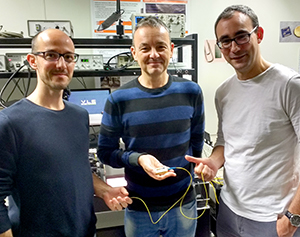UMWP-Chip
The researcher at iTEAM-UPV, José Capmany, has obtained an ERC Advanced Grant to design a universal programmable and multifunctional photonic chip
[ 29/05/2017 ]
The researcher at the Institute of Telecommunications and Multimedia Applications of the Universitat Politècnica de València (iTEAM-UPV), José Capmany, has obtained an Advanced Grant 2016, awarded by the European Research Council (ERC) to carry out his project UMWP-Chip, whose aim is to design, manufacture and characterize a universal programmable and multifunctional photonic chip.
Thanks to this award, UMWP-Chip will be carried out over the next five years and will receive 2.5 million euros. With the Advanced Grant, the European Research Council recognizes the excellence of projects that respond to society¿s medium and long-term challenges.
This is a necessary, flexible and easily scalable solution that will interconnect the wireless and photonic segments of communication networks
Information and Communication Technologies (ICT) are growing at a fast rate in terms of the demand for capacity, number of end users connected and infrastructure required.
To tackle this challenge, Capmany acknowledged the need to have a flexible and easily scalable solution that will interconnect the wireless and photonic segments of the communication networks, thereby preventing bottlenecks from forming in that transition, which significantly limit both the available capacity and bandwidth.
"We suggest", said the UPV researcher awarded the Premio Jaime I of New Technologies 2012, "a new universal and programmable photonic chip with completely new features, which will be made almost totally with silicon, although it will have indium phosphide in the lasers".
"This chip", added Capmany, "for example, will respond to the challenges of 5G communications and the Internet of Things, and it will be useful in other several fields as well, such as autonomous driving or wearable devices".
A new chip as small and compact as possible, prepared to support current and future frequency bands
All these applications require higher frequency, so it is necessary to reduce the size of antennas and associated circuits. In this case, our work is to make the converter behind the antenna, which is an interface chip, as small and compact as possible, as well as prepared to support both the current frequency bands and the future ones, designed for the fifth generation of mobile communication systems, commonly known as 5G.
"Autonomous driving applications," said Capmany, "need radar-type systems, radiolocation systems that provide the vehicle location to be used for safe driving. With this aim, it is necessary to have the feature of gathering data by radio and processing them. Once they are gathered by the antenna, the most suitable technology for processing them is fiber optics".
Wearables
"It is the same for wearables", said the researcher at UPV. "If there are a lot of people with devices and they send a high quantity of data to a base station, router, etcetera, it is necessary to efficiently manage that information because the data flow is huge. This requires a chip capable of supporting and processing all the data generated and sent in both directions".
With regard to 5G communications, there will be more coverage areas, but with a smaller size. "In that case, we need to convert different services, frequency bands and user signals that converge in the same antenna. The chip we have designed will respond to this current challenge and others in the future", concluded Capmany.
Outstanding news
 ARWU 2023
ARWU 2023
The Shanghai ranking reaffirms the UPV as the best polytechnic in Spain for yet another year
 Science Meets Regions CV 2023
Science Meets Regions CV 2023
The UPV and the Almussafes City Council begin a collaboration in search of solutions to maintain the automobile sector in the Valencia Region
 Scientific reference
Scientific reference
Avelino Corma, Distinguished Research Assistant at the UPV, awarded an Honorary Doctorate by the University of Huelva
 Micronanofabs NTC UPV-PERTE CHIP Conference
Micronanofabs NTC UPV-PERTE CHIP Conference
María Marced, TSMC Europe president: "The sector's future is bright, the market is expected to double by 2030"
 Goya nomination
Goya nomination
Javier Polo, who holds a degree in Audiovisual Communication from the UPV, directs the successful short documentary Una terapia de mierda
 Sant Carles Medal 2023
Sant Carles Medal 2023
The Faculty of Fine Arts of the UPV awards the Sant Carles Medal 2023 to outstanding Valencian art and culture figures







